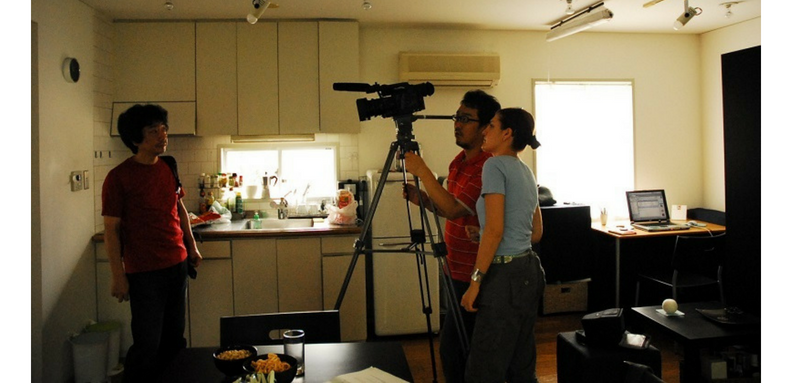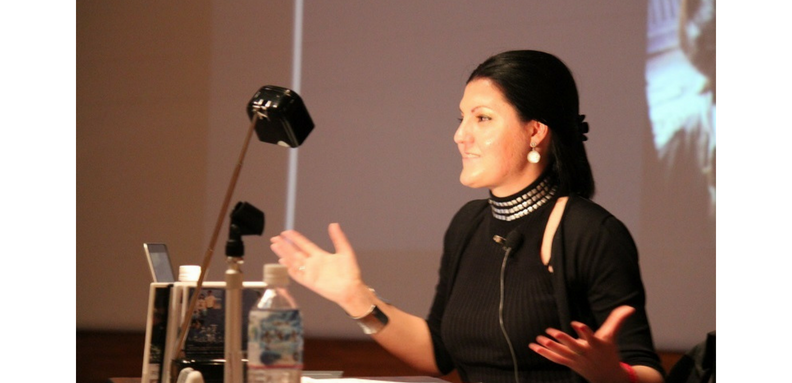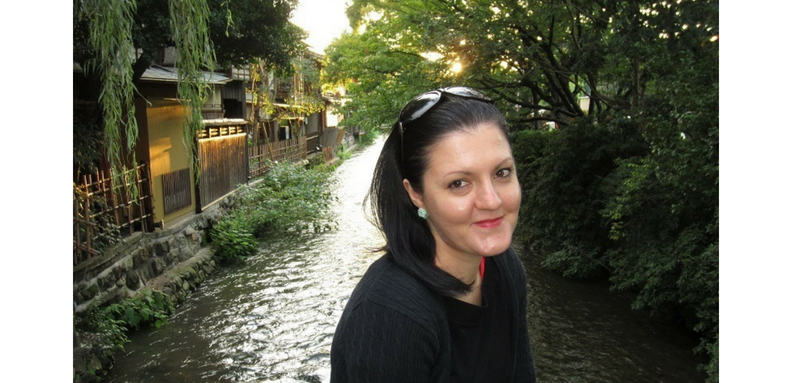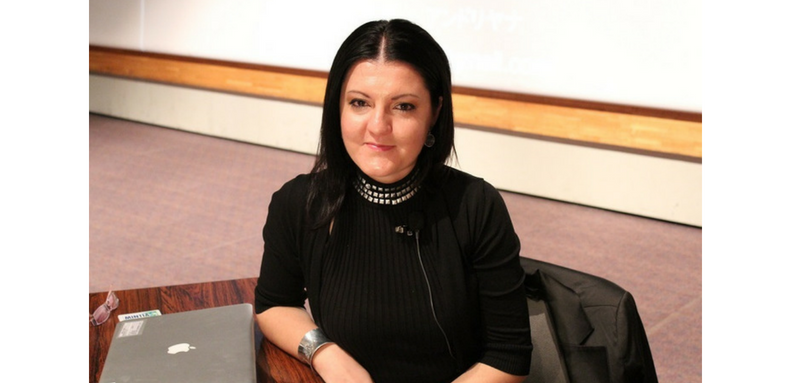







“WHEN I WAS A STUDENT” WITH ANDRIJANA CVETKOVIC, AMBASSADOR: I WAS THE FIRST EUROPEAN IN THE LAST 30 YEARS WHO HAS DOCTORATE AT THE BEST UNIVERSITY OF FILM IN JAPAN








Back in 2003, I had the thesis that digital technology would replace the analogue, and that happened, although when I wrote the thesis, I encountered immense resistance and denial from the filmmakers and my professors. I am happy that I did not give up and continued with my research, says Andriana Cvetkovic, our ambassador in Japan, who shared her story in the column “When I was a student”, which Fakulteti.mk realizes in cooperation with “Pivara Skopje”.
She is a real example of what kind of ambassador one country should have. Several years, she brings together the cultures of Macedonia and Japan, opens doors to our students in the advanced country, teaches the Japanese how to dance Macedonian traditional folk dance and to learn our culture.
The film is her love. Andrijana Cvetkovic is the first PhD in film art in independent Macedonia. She gladly returned to her student days.
She graduated from the National Academy of Film and Theater Arts (NATFIZ) in Sofia. Graduated before her generation, she earned a Master’s degree and took the opportunity to explore for a movie in Japan. She received her PhD at the best University of film art in Japan, Nihon University Graduate School of Arts.
She is happy that as a child she has discovered her love – the film or, more precisely, the passion for telling stories and through them to connect with the environment, but also with the world.
– I remember that I was 12 years old for New Year’s Eve. I was in the tailor’s workshop who sew my father’s suit and there was a book “History of Film Art” with a lot of visual material. The son of the tailor, an honest filmmaker, gave me the book with a hard heart, but that very evening I already decided that it would be my life path. I also had great happiness as a child and teenager to attend workshops for drama led by our best actors – Liljana Veljanovska, Dragan Spasov-Dac, Robert Veljanovski, the director Zoja Buzalkovska … wonderful people who gave me the love of art and founded in me the professionalism and the principles to what is working – says Cvetkovic.
When she decided to enroll for directing, many of her family were trying (well-intentioned) to change her mind, to choose something easier.
– Then I did not really understand how difficult, responsible and exhausting this profession is, but sometimes the less you know, the better.
For the entrance exam she was preparing for two or three years. She was in the class of one of the most famous Bulgarian directors, Ljudmil Staikov. At the entrance exam, besides the theoretical knowledge, she introduced her own collages that she was doing from a very young age.
– It’s amalgam from newspaper pictures, magazines combined with my sketches and drawings and each part tells a story. I think that they just set me apart from other students and left the impression that I have high creative intelligence and sensibility. I was one of the two girls in the class of directors of a total of seven students and the first that I graduated with the highest average, “she says.
In order to enroll in PhD studies, Ambassador Cvetkovic had to learn the Japanese language. She succeeded in a year, although she says that Japanese is a lifelong learning language. She was studying from dusk till dawn and from then on she wears glasses, but she says that persistence always pays off.
– The entrance exam consisted of three parts, including writing an essay on a topic that was revealed at the exam itself. I was the only European who passed the exam in the last 30 years. I did a PhD in 2009 with great success, although all the lectures and PhD dissertation had to be in Japanese. A few months ago, now as an ambassador, I visited my professors at the university and the dean, with whom we talked about cooperation with the Macedonian Universities. Everyone was very happy and proud that their student became an ambassador, and I am very glad that I managed to thank them for their mentoring investment in me as a professional and as a person, “the ambassador said.
She loved Japanese movie since she was little, and the influence of “Rashomon” by Akiro Kurosawa, which she watched on 6 years, was great.
She was the best student in primary school, as well as in high school (once” Mosha Pijade”, today “Arsenij Jovkov”). She says that she did not study too much, but that she was concentrated and participated in the classes, so she studied for the faculty the same way.
– In one way while I was in High School I considered myself as an insurgent. I was constantly wondering if the education system is good and whether the studing has passed and the studing for getting marks has some meaning if they can not be applied. And now I think that education must be constantly improved and that children should learn more through practical examples, workshops, discussions … only memorizing facts does not mean anything. The critical way of thinking, finding non-standard solutions must be preserved, and a generation of individuals who will think with their own heads must be preserved, they will check every information, they will try to work with their specific deeds to be part of the society, and less will be slaves of material rewards and conformity – says the director.
Professors in Macedonian language were her favorites
Macedonian language professors were always among the most beloved because she she learned to write essays on a free subject with them and and thus she was communicating with them and her classmates.
– I had great professors in Macedonia, but also in Bulgaria and Japan. I always had the most stringent class teachers, the toughest mentors, and I really appreciated them. These people could have been not so strict and maybe it would have been easier for them, but their rigor made me a person with very high professional standards, cofidence in my knowledge and an opportunity to compete on a global level – says Cvetkovic.
The most important thing for her was to attend a class that she was barely waiting to start, and there were professors on which students’ grades were not that important.
– I will not forget my professor of chemistry in primary school. Half of the class was about chemical elements, and the other half for her family destiny and tragedy as a refugee child from Aegean Macedonia. I am grateful that besides chemistry, we have learned a lot about life.
While studying in Sofia, she lived in the famous Student City, a settlement with about 15,000 students. She had fun and a lot of friends with which she was spending a great time.
With the film “House beside railroads” she graduated, and at the same time she received her master’s degree in 2005, a year before her colleagues from the class. That movie traveled to several world short film festivals. The whole team were volunteers. Her master’s thesis was “A Brief History of Digital Cinematography and the Next 100 Years”.
– In 2003 I had the thesis that digital technology would replace the analogue, and that happened, although when I wrote the thesis I encountered immense resistance and denial from the filmmakers and my professors. I am happy that I did not give up and continued with my research. They took me to Tokyo, “said our ambassador.
While she was studying there was a little time left for work, because the faculty required practical work, so whenever she had the opportunity, she worked something, but she did not allow anything to distract her from the main goal – the studies. She volunteered when she could, traveled a lot and says that it opened many horizons.
– I think that the student should dedicate at least 70% of his time to studies, because that time does not return. But at the same time, the practical work in the vocation for which he is studing is compulsory, and this is best as a volunteer. In Japan, all students are on unpaid practice in some place at least twice a week and getting the opportunity to volunteer in certain companies is prestige, “she says.
What is life and career if we do not have anecdotes about storytelling? We asked to share with our readers.
– I was the third year of film directing and preparing the shooting of my film. I had chosen the actors, and especially the main actress with whom I was not in contact, but I got through one friend and we scheduled a meeting. My friend gave her the script and she came to the meeting with great pleasure. But when I saw her, I realized that she was not an actress I really wanted to hire, but someone completely unknown to me, but with the same name as the other one. Imagine a few-hour meeting in which I did not want to harm the actor’s feelings and I could not immediately say that there was a mistake, and I was looking for ways to make her hesitate and give up. She did not give up, despite all my tricks. In the end, however, I had to be honest with her – admits Cvetkovic.
She has experience as a professor at several faculties and universities. Prior to becoming an ambassador, she was a visiting professor at the Kyoto University and in the prestigious scientific center for Japanese studies, Nichibunken. She taught at ESRA in Skopje and at the New European University (in Skopje), as well as at the “Nihon” University. As ambassador, with her dedicated work she managed to establish cooperation between Japanese and Macedonian Universities, so Macedonian students will be able to receive scholarships.
– As ambassador, I held over 30 lectures at all the most reputable Universities in Japan, but this time promoting Macedonia. These contacts with the universities and lectures brought me the greatest satisfaction and I am happy when I can convey to the youth in Japan my love for Macedonian history, tradition, art and culture. About the profession, I consider myself a “renaissance woman”, something like Da Vinci … One profession can not define me, nor do I see myself in a linear career. I want to constantly discover, learn, create, challenge, be a pioneer, connect and share – еnds Cvetkovic.









